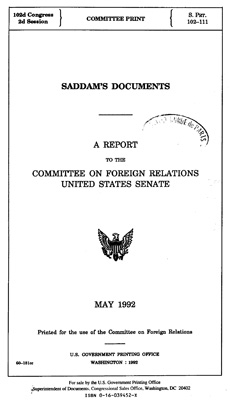| Éditeur : U.S. Government Printing Office | Date & Lieu : 1992, Washington |
| Préface : | Pages : 10 |
| Traduction : | ISBN : 0-16-039452-X |
| Langue : Anglais | Format : 145x230 mm |
| Code FIKP : Br.-Gén. 198 | Thème : Politique |
|
Présentation
|
Table des Matières | Introduction | Identité | ||
 Saddam's Documents | |||||
| Table des Matières | ||||
Executive Summary The Foreign Relations Committee now has in its possession 14 tons of captured Iraqi secret police documents. These documents provide an extraordinary insight into the character of Iraqi rule over the Kurds. They include the orders for the destruction of thousands of villages, the interrogation and torture records of Kurdish civilians, and the paper work associated with many of the 200,000 or more murders committed by Iraq's Ba'ath regime in the period 1987-1990. Combined with other evidence coming out of Kurdistan, these documents support the proposition that Iraq committed crimes against humanity and perpetrated genocide on its Kurdish minority. The Iraqi secret police were meticulous record keepers, and the captured papers document the massive brutality of Iraqi rule in Kurdistan. During the March, 1991 uprising in northern Iraq, Kurdish rebels captured huge quantities of these documents. While many documents were lost when the Iraqi army retook much of Kurdistan at the end of March, the rebels managed to hold some towns with document caches and took other documents to hideouts in the high mountains. As long as the documents remained in Iraq, they were at risk of being destroyed or falling again into Iraqi hands. Further, inside Iraq they cannot be easily used by those who might prosecute Iraqi officials for crimes against humanity. When I learned of the existence of these documents during a September, 1991 trip through Kurdistan, I asked the Kurdish leader, Jalal Talabani, if he would agree to sending them to safety outside Iraq. He readily agreed, with the proviso that the documents remain the property of his party, and that I work out satisfactory arrangements for their storage and use. Because he viewed Senator Pell as one of the earliest and most consistent champions of the Kurdish people, Talabani preferred that these documents be held by the Senate Foreign Relations Committee. In November, Senator Pell wrote Secretary of Defense Cheney asking that the U.S. military operating in northern Iraq assist in the transport of these documents to the United States. While Secretary Cheney responded promptly and affirmatively, bureaucratic wrangling, mostly in the Department of State, delayed the effort actually to extract the documents. Over the Easter recess, I travelled to Kurdistan to collect the documents and arrange for them to be delivered to the U.S. military for transport to the United States. I was able to deliver personally the first of 40 cubic meters of documents. These 40 cubic meters came from Talabani's party, the Patriotic Union of Kurdistan. In addition, I received a promise from the Socialist ... | ||||